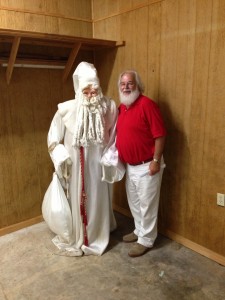He is “Saint Nicholas”. He is “Santa Claus”. He is “S. Claus”. He is simply known as “Santa”. To “children” of all ages, believing in Santa Claus is so very simple and easy to do.
Saint Nicholas – a brief history
St. Nicholas was born in 280 AD, in Patara, a city of Lycia, in Asia Minor. He became the
gift giver of Myra. His gifts were given late at night, so that the gift giver’s Identity would
remain a secret. St Nicholas was eventually named the patron saint of children, sailors,
Russia and Greece.
St. Nicholas was a Christian priest, who later became a bishop. He was a rich person, and
traveled the country helping people, giving gifts of money and other presents. St.
Nicholas did not like to be seen when he gave away presents, so the children of the day
were told to go to sleep quickly or he would not come! Nothing has changed and Santa
Claus will not arrive this Christmas unless the children go to sleep early.
A famous story about St. Nicholas, is about a poor man who had no money to give to his
three daughters on their wedding day. St Nick dropped bags of gold into the stockings
which the girls had left to dry by the fire. The sisters found the gold and ever since,
children have hung up stockings on Christmas Eve hoping that they will be filled with
presents by Christmas morning.
Despite being quite young Nicholas had earned a reputation for kindliness and wisdom. In
the year 303, the Roman emperor Diocletian commanded all the citizens of the Roman
Empire, which Included Asia Minor, to worship him as a god.
Christians believed in one god and one god alone, so their conscience would not allow
them to obey the Emperor’s order. Angered by their stubbornness, Diocletian warned the
Christians that they would be imprisoned. The Emperor carried out the threat and St
Nicholas who resisted too was also imprisoned. For more than five years, St Nicholas was
confined to a small cell. He suffered from cold, hunger, and thirst, but he never wavered
in his beliefs. In 313, when Diocletian resigned, and Constantine came to power Nicholas
was released, and he returned to his post as Bishop of Myra. He continued his good works
and became even wiser and more understanding by the time of his death on December 6,
343.
In the eyes of the Catholics, a saint is someone who has lived such a holy life that, after
dying and going to heaven, he or she is still able to help people on earth. They often
become patron to different groups of people – one such was children and many legends
sprang up to explain his presence.
By 450, churches in Asia Minor and Greece were being named in honor of him. By 800, he
was officially recognized as the a saint by the Eastern Catholic Church.
In the 1200s, December sixth began to be celebrated as Bishop Nicholas Day in France.
By end of the 1400s, St Nicholas was t he third most beloved religious figure, after Jesus
and Mary. There were more than 2000 chapels and monasteries named after him.
In the I5OOs people in England stopped worshipping St Nicholas and favored more another
gift giving figure Father Christmas. Over the centuries, St. Nicholas’ popularity grew, and
many people in Europe made up new stories that showed his concern for children. The
name Santa Claus was derived from the Dutch Sinter Mass pronunciation of St. Nicholas.
Early Dutch settlers in New York (once called New Amsterdam) brought their traditions of
St Nicholas. As children from other countries tried to pronounce Sinter Klass, this soon
became Santa Klass, which was settled as Santa Claus. The old bishop’s cloak with mitre,
jeweled gloves and crozier were soon replaced with his red suit and clothing seen in
other modern images.



